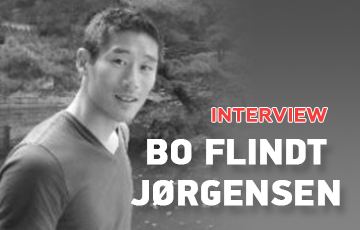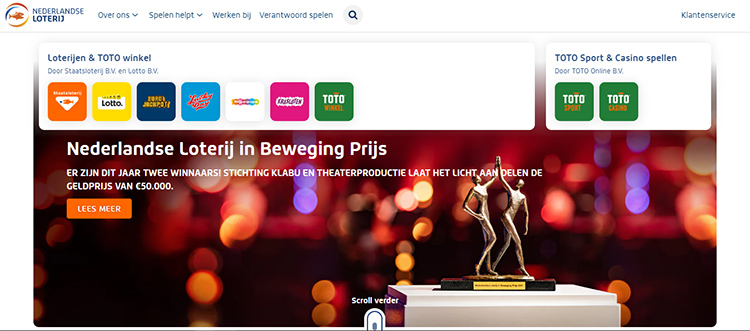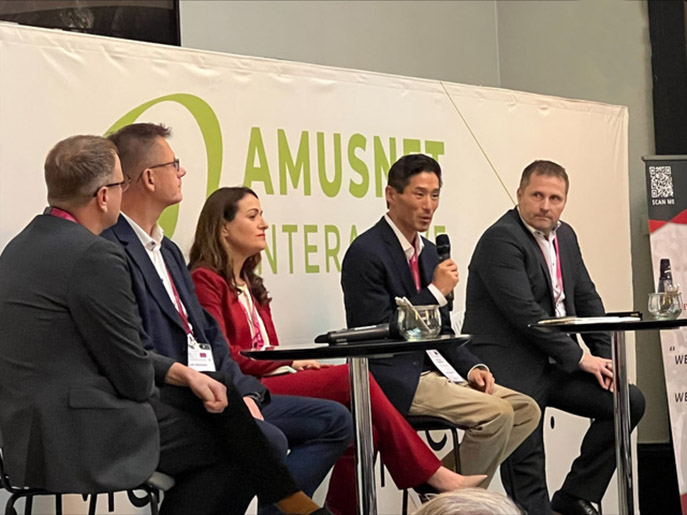«I ended up in the Gaming industry by coincidence» — interview with Founder of Happy Gamer ApS Bo Flindt Jørgensen

We continue our series of interviews with famous people from the world of casinos and gambling. This time we were able to chat with Founder of Happy Gamer ApS Bo Flindt Jørgensen, who has been working in the lottery industry for more than 15 years. Talk about why once you have entered the Gaming industry, it is so difficult to leave. Learn why lotteries are so popular among Danish players and what their specifics are. We look behind the scenes and find out how the new platform provider and casino game provider search takes place, how negotiations with major providers take place, and what expenses are incurred by the casino. Our readers will learn about this and many other interesting topics in today’s interview.
– Please introduce yourself and tell us about yourself.
My name is Bo Flindt Jørgensen and I have been in the Lottery & iGaming industry for more than 15 years. I am located in Copenhagen, Denmark where I live with my beautiful family. It’s been a pleasure and honor to work in the industry for many years and with great people and companies and I am happy to share some of my experiences.
– You studied marketing and business, worked in Youth Red Cross, were responsible for a new fashion brand development, were project coordinator at Football Festival Denmark. Tell us why you decided to tie your life with iGaming.
I ended up in the Gaming industry by coincidence. It was not something that I wished for or a career path that I had planned. When I graduated and got my Master degree I was close to signing a contract for a FMCG company in Denmark where I would be responsible for marketing and communication for a detergent brand. But I was invited to a job interview at Danske Spil that had a marketing position for their Sportsbetting brand. Getting a job that would combine Sports with Marketing was something that really appealed to me and I signed the contract immediately after I was offered the job.
Once you have entered the Gaming industry, it is so difficult to leave. It brings a lot of opportunities and it is a very dynamic environment with great people.
– What games are popular among Danish players? Slots, poker or any other table games?
Lottery games are the most popular game in Denmark. More than 2 million players have played Lotto, EuroJackpot or VikingLotto. Casinos and especially slots have seen amazing growth rates within the last year (double digit year on year growth rates). Slots account for 75% of all GGR on Online Casino. Roulette accounts for a little less than 10% of Casino GGR and BlackJack accounts for 7,5% of Casino GGR.
Sportsbetting accounts for approx. 40% of the licensed iGaming market where Live Betting has become more and more popular over time.
Poker does not account for a high market share and it is a gaming category that has declined since the market was liberalized back in 2012.
– Tell us how iGaming in Scandinavia is different from iGaming in other countries.
First of all it is important to recognize that there are major differences between the markets in Scandinavia. Denmark and Sweden operate with a licensed market model and have achieved a high channelization (approx. 85-90%). Norway and Finland are still monopoly markets with a low degree of channelization and an attractive grey/black market.
What is common for the licensed Scandinavian markets is that it is heavily regulated and responsible gaming and player protection plays an important part in how the gaming law is formed. There are limitations on bonuses, marketing, VIP management, KYC validation, AML checks and so forth, so in many ways it forces the operators to be more creative to gain a competitive edge.
The Scandinavian market is very mature and competitive. The player value is high compared to other countries, so it attracts many operators and iGaming companies which leads to capital and knowledge being invested in the Nordics.
Even the State Lotteries (Danske Spil, Svenska Spel, Norsk Tipping and Veikkaus) are at the forefront of the industry and have launched amazing innovations, solutions and services to their player base.
– In De Lotto you were involved in transforming a traditional and land-based focussed Lottery into a digital gaming operator. Tell us more about that process, please.
That was an amazing project that I was lucky to be deeply involved in. First of all I helped with the merger of De Lotto and Nederlandse Staatsloterij. That formed Nederlandse Loterij. The next step was to prepare for the Dutch licensed market. I had the experience from my 6.5 years at Danske Spil where we did the same — taking a traditional State Lottery into the iGaming space launching new gaming verticals and improving current product categories and services.

It is difficult to summarize the process in short because it was a complex operation that took time, energy and team effort of the whole organization. Obviously you need to redefine the corporate strategy, source new suppliers, restructure the organization, develop new services, etc. The most important process was to manage the cultural change and the employees. iGaming products and brands demand a different approach and heart beat to become successful. It is very different from a lottery with weekly or monthly draws. I believe that was achieved with great success.
– You have worked with companies whose main focus is lotteries. Why do you think they are popular among players?
I have made many research studies to identify player preferences and motives to play. If I am to prioritize decision variables for choosing a product and/or brands these would be: 1) Trust, 2) Supporting good causes, 3) Winning a prize / High Jackpot, 4) Easy to play / participate and 5) I can get a wide variety of games.
Lotteries can deliver on most of these variables and have a “monopoly” on some of these. Lotteries also play high emphasis on player protection and responsible gaming and that is something that resonates well in the greater public opinion. Lotteries are often well known and have high brand recognition and brand strength, so it is only natural that Lotteries are a preferred operator for many players.
When Danske Spel and Svenska Spel entered the licensed market they had, or were given, a competitive advantage. That allowed them to earn high market shares on product categories like Casino and Sportsbetting. Over time you cannot maintain a market leading position, so these Lotteries have now earned their strong position by smart and innovative investments and developments.
– In Nederlandse Loterij you were involved in contracting and negotiation with Nyx, Microgaming, Evolution Gaming, Intralot, and Kambi. Could you tell us how this process works?
There is a big difference between sourcing a new platform supplier and a Casino game vendor. The process for contracting a platform supplier is quite lengthy and there are many steps before the negotiation and contracting phases starts. First we defined the requirements, then we outlined a long-list of suppliers, we requested information (RFI) based on the requirements and received a response from the suppliers on the long-list. Based on our review and scoring of the response we cut the list down to a short-list and issued an RFP. The RFP process ended with having a preferred supplier with whom we initiated negotiations and ultimately signed a contract with.
Contracting a Casino games vendor is more simple. We started conversations with the game suppliers, we checked what kind of integrations that they had with our platform supplier and we went into commercial and financial negotiations.
The process of selecting a platform supplier can take +1 year whereas a Casino game vendor can take 1-3 months. A Sportsbook supplier is more complex and is more similar to the approach of selecting a platform supplier.
– Which companies are more difficult to negotiate with? They are probably the industry giants. Are there any specifics in working with them?
Haha..I could easily mention names here. But allow me to answer the question by stating that there is no clear pattern in identifying which companies are easy and difficult to work or negotiate with. Obviously the industry giants know their position and strength, but small companies or start-ups can also be difficult to negotiate with, especially if they are not well informed about the market conditions, legislation and taxation that is applicable in your region.
What is important to me is how we act in the selection-, negotiation- and contracting process. If you are professional, respectful, knowledgeable and you do your due diligence you often get good results providing mutual benefits to all parties.
It is important to understand that you are dealing with people that are also looking at their own interest, and there will be no long-term benefits if all parties are not happy and to some extent satisfied. I would rather settle on a fair compromise than fighting hard to get the revenue share down with 1%.
– Why do some casinos offer software from only 1-3 providers, while others have games from almost all of the existing ones, ranging from not well-known start-ups to famous studios?
It all depends on the strategy of each Casino brand and how they want to enter their markets and position themselves. I have seen highly profitable brands only offering a portfolio of +10 in-house built games and other brands advertise themselves with a portfolio of +3.000 different Casino games from +45 different game vendors.
It is so difficult to create a competitive advantage or a unique position in the Casino market and profitability depends on the commercial agreements that an operator can achieve with the game vendors. It is challenging to earn a profit if you have to pay a revenue share of 15% of NGR, pay taxes of 15-30% of GGR and cover all operational and marketing costs.
The reality is also that 80-90% of Casino brands customer portfolio will put their money on 10-15% of the games offered. Casino brands should use new games and game studios for promotional purposes and to revitalize their brand in the player perspective.
A Casino brand should focus on localizing content and producing their own games to their markets. I have seen great examples of Casino brands achieving a strong position and gaining market shares by including this in their strategy.
– Are you gamble by the way? If yes, do you prefer lotteries? Tell us about your favorite game.
Yes, of source if play. One can’t become a good kitchen chef if one does not taste the food. I play everything from Poker, Live Roulette, Slots, Live betting, I use bet builder features to create fun bets to increase the excitement of following sports, I buy Lotto tickets when the Jackpot is high and I subscribe to traditional class lottery games.
I also play free games on my mobile. The business model on app games is quite good and if you can design your games well it can attract a large customer base. The whole money-in-no-money-out model is something that is fascinating.
– In 2017, you founded Happy Gamer. Tell us why you decided to start your own business.
I started Happy Gamer because I wanted to take all my experience and leverage that knowledge out on different customers and organizations in the industry. One thing is to work for a State Lottery or an iGaming brand, another is to get a good insight into the supplier side, affiliate business and the regulators.
Setting up my own consultancy company enabled me to work with a diverse set of clients within the Lottery and iGaming industry on both B-2-C and B-2-B. That has increased my own knowledge base of the industry and given me many different perspectives and insights.
I like the fact that I can work on intense short term projects where we rapidly need to implement a new game feature or find a new payment solution and next to this try and change the corporate culture of an old traditional lottery where you only slowly see the change taking effect.
– In just 5 years of operation, your company has achieved success, you are working with Holland Casino, Novomatic, Winners Group, The Icelandic State Lotteries and many other famous companies. Share your secret to success, please.
Creating a strong network of colleagues and industry friends has been the main source of my success. Of course you need to be professional, respectful, always pursue new knowledge and put in hard work, but working with good people and investing in relationships is the key to new business opportunities.
And then you need to deliver successful projects and create happy clients and if you fail or something unexpected happens, you need to be honest and transparent.

– Give advice to other entrepreneurs who have decided to start an iGaming business.
My advice would be:
- Don’t go for the easy money, go for the good people.
- Learn the math behind the iGaming industry. What makes companies profitable and grow. You need to understand this in order to provide good recommendations and make long-lasting changes that will have a positive impact.
- Play the games and sign up for all the Lotteries and iGaming brands that you can. It is a great way to learn the industry and to find out what works and how to improve for the better.
- Enjoy the fun… It is a fun and exciting industry, make sure you enjoy it and be aware of the impact your work can have on many people that love to play in the Lottery or placing some bets on a Premier League match.
– What do you think about gambling industry in 10-20 years?
To some extent it will be the same as now and as it was 20 years ago. People will still play Poker and buy lottery tickets as they have done for 100 years. The mechanics behind many of the popular games have been consistent and will remain because there is a customer audience for it.
But technological developments will result in different ways of engaging in Gambling. New platforms will arise, different payment solutions will impact the industry. Personalisation on a 1:1 level will be fully implemented. Gaming and Gambling in a virtual setting will be more dominant and elements such as NFT’s, Blockchain and the Metaverse will to some extent play a role in the way people interact with gaming brands and their products.
Regulation will take place in the industry and that will put demands on the operators and suppliers. It will have a positive impact on player protection, but it could also push players to the grey/market if legislation does not manage to create an attractive licensed model.
– Tell us about your plans for the future.
I actually don’t have big plans for the future at the moment. I would love to take another State Lottery into the iGaming space and help to develop their strategy, find the right suppliers, adjust their CRM and customer retention activities, develop their go-to-market plans and change the culture to achieve high performing teams. But I also see high value in helping a supplier to win more clients or designing a new front-end solution for a new Bingo brand.
The industry gives you a lot of opportunities. I love working in the industry, so I will embrace all new challenges in the future with a positive mindset.
Thank you for interesting answers!


